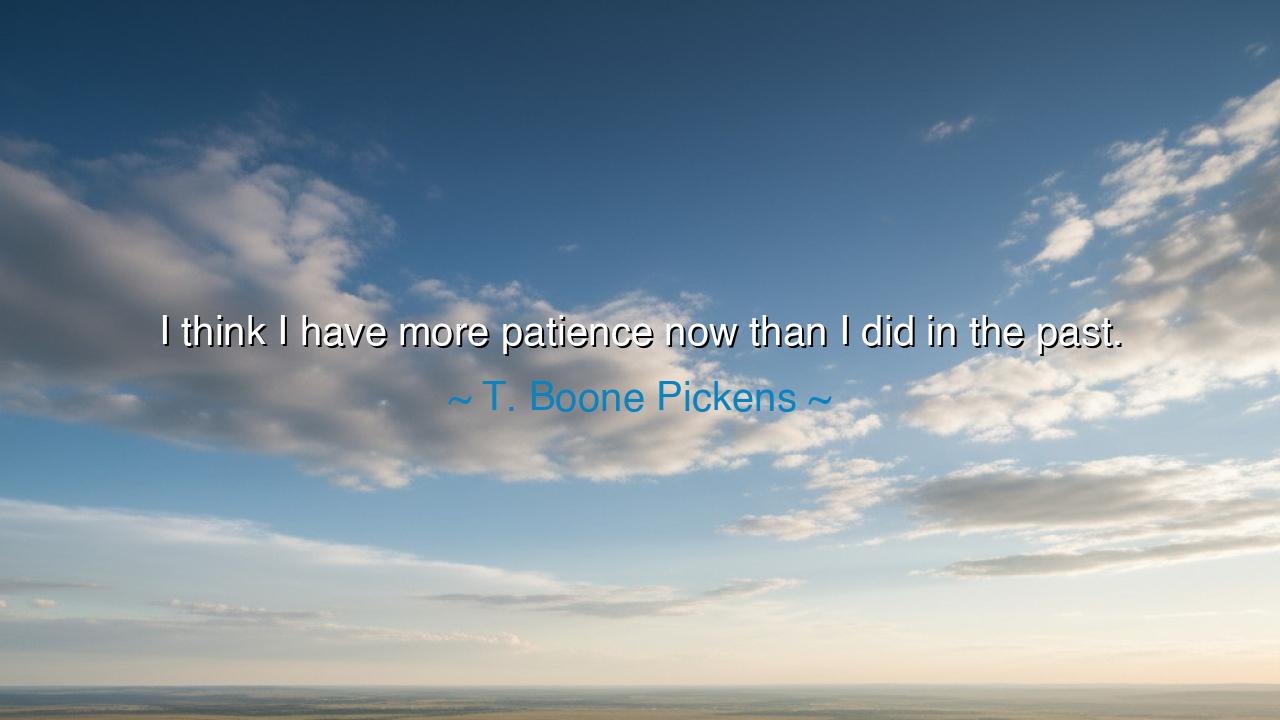
I think I have more patience now than I did in the past.






The American business magnate and energy pioneer T. Boone Pickens, reflecting upon the arc of his long life, once said: “I think I have more patience now than I did in the past.” These simple words, though modest, carry the weight of a truth known to all who have walked through the seasons of life: that patience is not given in fullness at the beginning, but is cultivated through years of trial, loss, and victory. Youth is fiery and restless, eager for swift triumphs; age is seasoned and steady, content to wait for the right moment to act.
To confess that one has more patience now is to admit that in the past, one was driven by urgency — by the desire to seize opportunities before they slipped away, to fight every battle in haste, to measure success by speed. Pickens himself, a man of immense ambition, rose and fell in business, enduring both wealth and loss. Through these storms he learned that the greatest rewards often come not to the swiftest, but to those who endure the long race, who can wait for the fruit of their labor to ripen fully.
This growth from impatience to patience mirrors the journey of civilizations. Consider the great general George Washington, who in the Revolutionary War often restrained his men from reckless assaults. Many in his ranks cried for immediate battle, but Washington’s patience, forged in earlier defeats, taught him the value of waiting. His refusal to squander his army preserved the revolution, and in time, brought victory. Like Pickens, Washington’s maturity gave him what youth had not: the wisdom to see that restraint can be more powerful than haste.
Pickens’ reflection also reminds us that patience is not weakness, but strength refined by experience. The impatient man is often enslaved to his desires, unable to endure discomfort or delay. But the patient man commands himself, and by commanding himself, he commands circumstances. This lesson is learned not in ease, but in hardship — in moments when life does not bend to one’s will, when fortune is slow to answer, when loss demands endurance. From such crucibles, patience emerges as a crown upon the head of the wise.
There is also a humility in Pickens’ words. By admitting that he was once less patient, he acknowledges the folly of youth, the mistakes of haste, the pride of wanting everything at once. His life, filled with battles in the oilfields and on Wall Street, taught him that greatness is not built overnight. To say “I have more patience now” is to offer testimony that time itself is a teacher, and that we are always becoming, always learning.
The lesson for us is profound: do not despise the waiting seasons of life. They are not wasted time but sacred ground where character is formed. Work diligently, yes, but do not demand that all things yield instantly to your effort. Let patience temper ambition, let wisdom govern desire, and let endurance carry you when haste would fail. For the one who waits with strength will reap a harvest that the impatient will never see.
Therefore, O seekers of wisdom, take to heart the words of T. Boone Pickens. Strive, but do not rush blindly. Dream, but let your dreams unfold in their appointed time. Know that with each year that passes, life will give you more patience if you allow it, and with patience, you will gain mastery not only over your work, but over yourself. For he who learns patience learns the secret rhythm of life, and in that rhythm finds both peace and lasting triumph.






AAdministratorAdministrator
Welcome, honored guests. Please leave a comment, we will respond soon